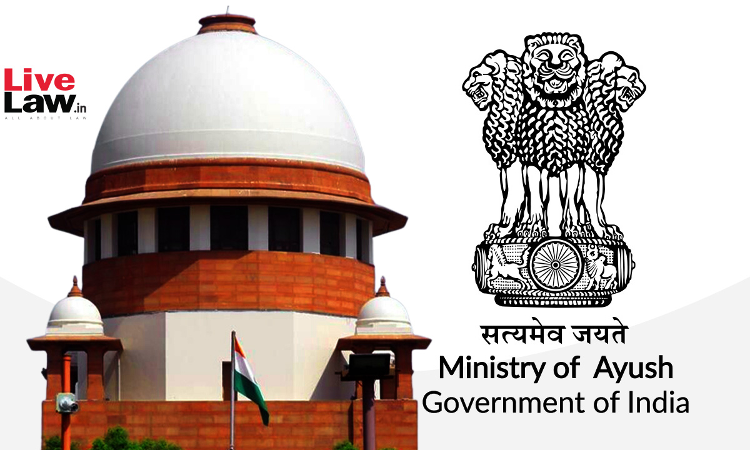The Supreme Court on Monday vacated the interim order staying the omission of Rule 170 of the Drugs and Cosmetics Rules, 1945 which prohibits advertisements of Ayurvedic, Siddha, or Unani drugs without licensing authorities’ approval.
A bench of Justice BV Nagarathna and Justice KV Vishwanathan disposed of a petition filed by the Indian Medical Association (IMA) concerning misleading claims and advertisements against allopathic medicine.
“The prayers sought for have been achieved in as much as the reliefs have been granted by the court. We find that no object and purpose would be served in considering the petition any further. Hence the writ petition stands disposed of. However liberty is reserved to the parties/intervention applicants to seek relief in accordance with law if they have any grievance with regard to the omission of Rule 170. Consequently the interim order dated 27th August 2024 stands vacated”, the Court observed.
The Court reserved liberty to all parties to seek relief in accordance with law if they have any grievance regarding the omission of Rule 170 and kept all contentions open to be agitated in appropriate proceedings.
The Ministry of AYUSH had, by a notification dated July 1, 2024, issued the Drugs (Fourth Amendment) Rules omitting Rule 170. However, on August 27, 2024, the Supreme Court stayed the notification, observing that it ran contrary to its earlier May 7, 2024 order which had directed adherence to Rule 170.
The Court said that the writ petition can be closed as the original grievance in the petition had been addressed by various previous orders including an order dated March 26, 2025 by which the Court issued a series of directions to state governments to implement the Drugs & Magic Remedies (Objectionable Advertisements) Act, 1954.
During the hearing today, Advocate Archana Pathak Dave for the Union of India sought vacation of the stay on the omission of Rule 170 of the Drugs and Cosmetics Rules, 1945.
Amicus Curiae Senior Advocate Shadan Farasat opposed it, stating that “in reality Rule 170 brings Ayurveda in line with allopathy” and that “a lot has happened since the 27 August 2024 order imposing the stay…The states have been implementing the Rule.”
However, Justice Vishwanathan asked, “Can it be implemented when it has been omitted?” Justice Nagarathna remarked, “So long as they are allowed to manufacture it, how can you later say that don’t advertise?”
Advocate Pranav Sachdeva for an intervenor also supported the stay, arguing that while regular drugs undergo testing and approvals, Ayurvedic drugs are not subject to such procedures.
“They will say this will cure diabetes etc. There are millions of people who are illiterate and go for it. Look at the misuse. That is why the Court said that this is contrary to our directions. If you repeat this will cause havoc,” he said. He added that “people spend several years going after these and realise there is no such remedy.”
Justice Nagarathna responded, “Then manufacture itself should be banned.” Farasat emphasised that the Court had put in significant effort to put a regime in place for implementation of Rule 170 and that should not be undermined.
However, Justice Nagarathna questioned the rationale of merely banning advertisement when manufacture is allowed. “Once you allow manufacture, the advertisement is a natural business practice”, she pointed out.
Farasat said that the key distinction lay in the purpose of the advertisement, whether it was for a supplement or a treatment. Sachdeva added, “It may be a good supplement, a good product, but to advertise it as a cure for a disease may not be in the best interest because there are large number of people who are gullible.”
However, the bench opined that persons who are aggrieved by the concerned notification omitting the Rule can initiate appropriate proceedings before appropriate forum.
Background
The case originated from IMA’s plea seeking regulation of medical advertisements by Patanjali Ayurved Ltd. It later expanded to include contempt proceedings against Patanjali, its MD Acharya Balkrishna, and co-founder Baba Ramdev for violating an undertaking not to publish misleading advertisements.
In August 2023, the Ministry of AYUSH had directed all State/UT Licensing Authorities and Drug Controllers not to take action under Rule 170, pending a proposal to omit it. On May 7, 2024, the Union told the Court it would withdraw this letter, but instead issued the July 1, 2024 notification omitting the Rule. This led to the August 27, 2024 stay by a bench of Justices Hima Kohli and Sandeep Mehta, which held that the omission “flies in the face” of its earlier directions and ordered that Rule 170 remain in force until further orders.
The matter also concerned enforcement of the DMR Act, which prohibits objectionable advertisements of drugs and magic remedies.
On March 26, 2025, a bench of Justice Abhay Oka and Justice Ujjal Bhuyan issued a series of directions to state governments to implement the Act, including appointment of gazetted officers under Section 8, creation of grievance redressal mechanisms, and police sensitisation. The Court stressed that, despite being over 70 years old, the Act was not implemented in letter and spirit, and warned of the harm such advertisements could cause.
It directed the National Legal Services Authority to conduct awareness programmes, required states to publicise complaint mechanisms, and asked the Union to develop a dashboard for tracking action against misleading advertisements. The states and the Union were directed to report compliance by June 2025.
Contempt proceedings against Patanjali and IMA President Dr. RV Asokan were eventually closed after apologies were tendered and accepted.
Case no. – W.P.(C) No. 645/2022
Case Title – Indian Medical Association v. Union of India
